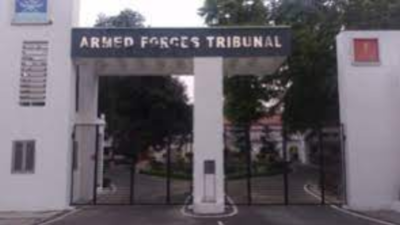- News
- City News
- chandigarh News
- 'Alcoholic' soldier liability for Army: Armed Forces Tribunal rejects disability pension plea
'Alcoholic' soldier liability for Army: Armed Forces Tribunal rejects disability pension plea

Representative Purpose Only
CHANDIGARH: Upholding the discharge of an "alcoholic" soldier from the Army without disability pensionary benefits, the Armed Forces Tribunal (AFT) has observed that such soldiers become a liability for the commanding officers (COs) of the units and that they can be adjusted only to some extent.
The AFT's Lucknow bench comprising, judicial member Justice Umesh Chandra Srivastava and administrative member Vice Admiral Abhay Raghunath Karve, passed these orders while dismissing a plea filed by Pushpa Devi, wife of a former Havildar Clerk (now deceased) rank soldier from Bageshwar district of Uttarakhand.
"Having heard the learned counsel of the parties and gone through the relevant records, it is clear that the applicant's husband was an indiscipline case in the unit and due to his misconduct, he was punished on six occasions by different commanding officers. Absenting from the field area is a serious offence, where day and night everyone has to be alert and keep vigilance round the clock. The presence of every individual on a specific task is of paramount importance in the field area. Such a defaulter loses credibility and faith in a unit and becomes ultimately a liability. The commanding officer exercises corrective measures and tries to adjust such liabilities in a unit up to some extent. The commanding officer of a unit is a father figure who takes care of his unit as a family," observed the tribunal.
The applicant's husband was enrolled in the Army on January 24, 1988, and served in different units till he was discharged from service. During his tenure of service in the Army, he was awarded six red ink entries for different offences.
The commanding officer invoked Rule 13 (3) III (v) of the Army Rules 1954 and discharged the applicant's husband from service on December 12, 2001, being an undesirable soldier. The deceased soldier was a habitual offender and indulged in intoxication. He was counselled time and again to refrain from alcohol. Due to excess consumption of alcohol, in 2000, he suffered from "affective psychosis (bipolar)-296" and was admitted to Military Hospital, Mathura, where his medical category was downgraded to S2 (temp).
After discharge from service, a disability pension claim was rejected by PCDA (P), Allahabad, vide order dated August 31, 2005. Aggrieved, the applicant's husband had submitted a representation dated October 21, 2005, addressed to the President, which was later rejected through a letter dated January 3, 2006. The disability pension given to a soldier discharged on medical grounds is a little higher than the normal pension.
The late soldier's wife had later approached the AFT, demanding a disability pension as her husband was discharged from the service on medical grounds.
After hearing the plea, the tribunal relied on the remark of the psychiatrist clearly stating that her husband was a case of a psychotic disorder (a mental disorder) which manifested in excess consumption of alcohol, though he was advised to refrain from alcohol.
"The husband of the applicant had put in 13 years plus service, which could have made him entitled to grant of disability pension, being discharged in the low medical category. But keeping in view the fact that he had set a bad example in the unit, he was discharged from service being an undesirable soldier," the tribunal observed while dismissing the plea.
The AFT's Lucknow bench comprising, judicial member Justice Umesh Chandra Srivastava and administrative member Vice Admiral Abhay Raghunath Karve, passed these orders while dismissing a plea filed by Pushpa Devi, wife of a former Havildar Clerk (now deceased) rank soldier from Bageshwar district of Uttarakhand.
"Having heard the learned counsel of the parties and gone through the relevant records, it is clear that the applicant's husband was an indiscipline case in the unit and due to his misconduct, he was punished on six occasions by different commanding officers. Absenting from the field area is a serious offence, where day and night everyone has to be alert and keep vigilance round the clock. The presence of every individual on a specific task is of paramount importance in the field area. Such a defaulter loses credibility and faith in a unit and becomes ultimately a liability. The commanding officer exercises corrective measures and tries to adjust such liabilities in a unit up to some extent. The commanding officer of a unit is a father figure who takes care of his unit as a family," observed the tribunal.
The applicant's husband was enrolled in the Army on January 24, 1988, and served in different units till he was discharged from service. During his tenure of service in the Army, he was awarded six red ink entries for different offences.
The commanding officer invoked Rule 13 (3) III (v) of the Army Rules 1954 and discharged the applicant's husband from service on December 12, 2001, being an undesirable soldier. The deceased soldier was a habitual offender and indulged in intoxication. He was counselled time and again to refrain from alcohol. Due to excess consumption of alcohol, in 2000, he suffered from "affective psychosis (bipolar)-296" and was admitted to Military Hospital, Mathura, where his medical category was downgraded to S2 (temp).
After discharge from service, a disability pension claim was rejected by PCDA (P), Allahabad, vide order dated August 31, 2005. Aggrieved, the applicant's husband had submitted a representation dated October 21, 2005, addressed to the President, which was later rejected through a letter dated January 3, 2006. The disability pension given to a soldier discharged on medical grounds is a little higher than the normal pension.
The late soldier's wife had later approached the AFT, demanding a disability pension as her husband was discharged from the service on medical grounds.
After hearing the plea, the tribunal relied on the remark of the psychiatrist clearly stating that her husband was a case of a psychotic disorder (a mental disorder) which manifested in excess consumption of alcohol, though he was advised to refrain from alcohol.
"The husband of the applicant had put in 13 years plus service, which could have made him entitled to grant of disability pension, being discharged in the low medical category. But keeping in view the fact that he had set a bad example in the unit, he was discharged from service being an undesirable soldier," the tribunal observed while dismissing the plea.
FOLLOW US ON SOCIAL MEDIA
FacebookTwitterInstagramKOO APPYOUTUBE
Start a Conversation
end of article









